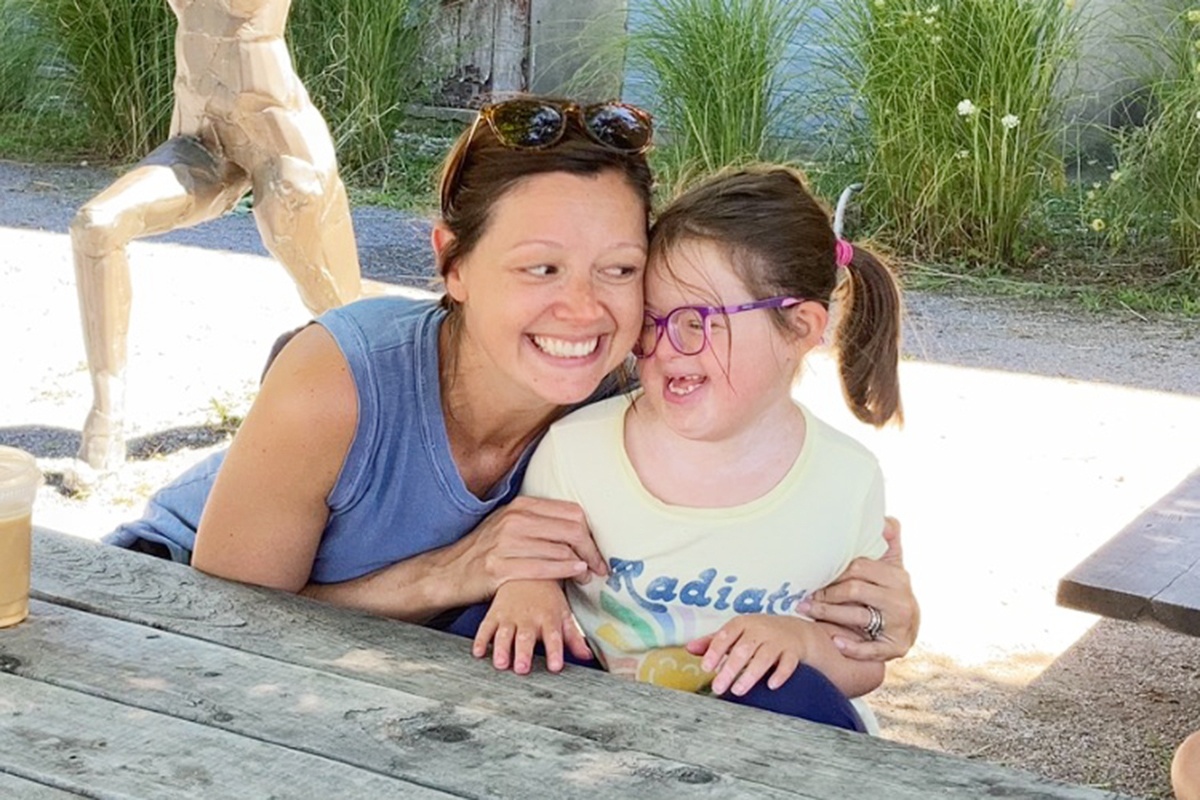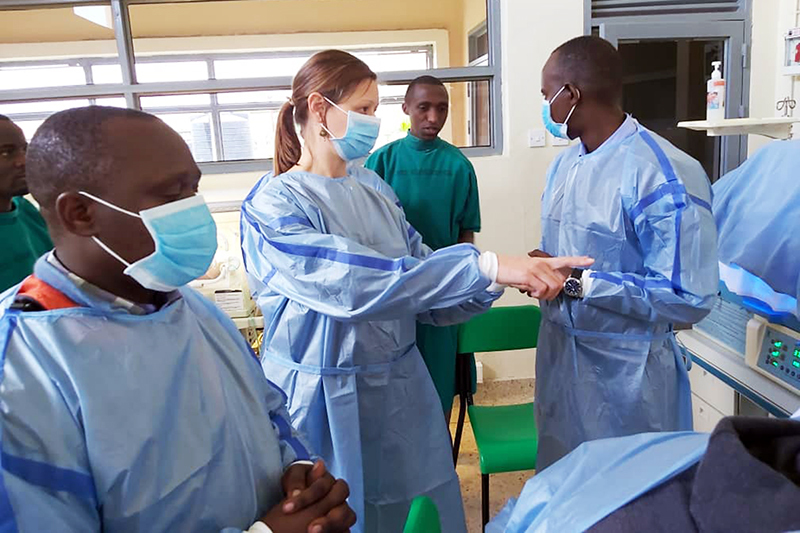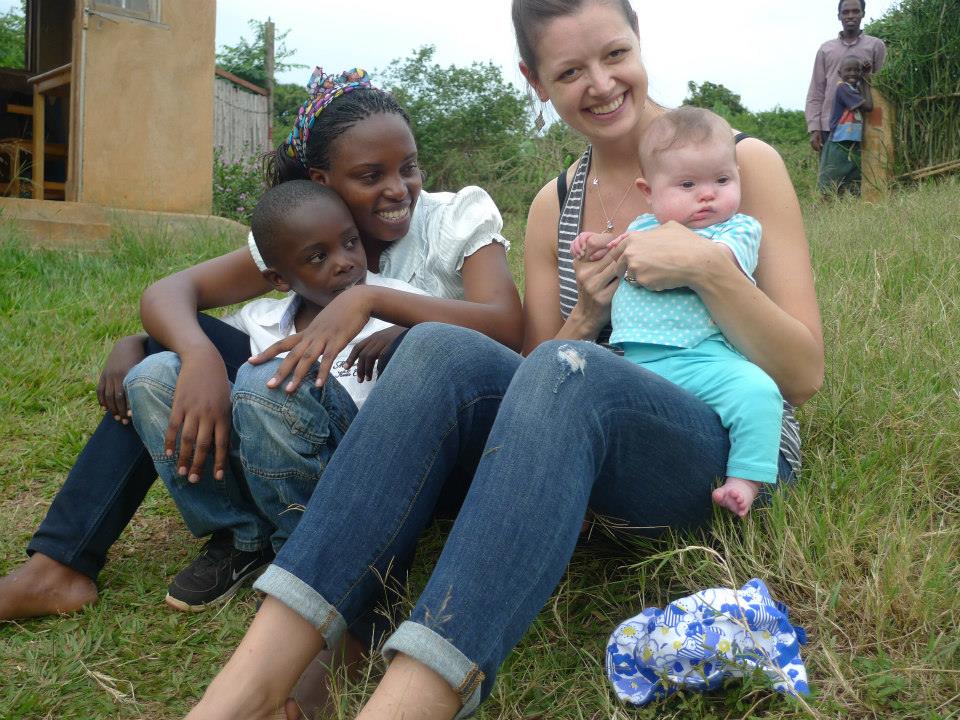For Child With Down Syndrome, A Tale of Two Health Care Systems
A mother calls for more global resources, support for people with developmental disabilities
Posted on Oct 31, 2022

Cory McMahon, chief nursing officer at Partners In Health, writes below about her daughter with Down syndrome and the many global inequities surrounding the care and treatment of children with developmental disabilities.
I often reflect on Paul Farmer’s words: “The idea that some lives matter less is the root of all that is wrong in the world.” As chief nursing officer at Partners In Health, this call to action drives our nursing efforts in some of the world’s most resource-limited countries. As the mother of a child with disabilities, Paul’s radical sentiment on worldwide humanity hits close to home. My daughter, Mali, now 9 years old, has Down syndrome. She faces a lifetime of navigating an exclusionary society full of barriers for people with Down syndrome and other developmental disabilities.
I was working for the Human Resources for Health initiative in Rwanda prior to Mali’s birth. My partner and I came back to the United States for her delivery, always planning to return to Rwanda. But when we learned that our daughter was born with Down syndrome and grasped the full extent of Mali’s needs, we decided to remain in the U.S., where we had full access to medical specialists and social support networks, including our own family and friends and a strong Down syndrome community. The decision to stay was complex and wrought with mixed emotions.
The privilege we were afforded simply by being born in the U.S. became abundantly clear; because of that simple fact we knew Mali could get top-quality care from a team of practitioners and specialists throughout her life.
A Whirlwind of Care
And care she got: from her earliest days there would be a whirlwind of tests and appointments, medical and child development experts. We were connected to a Down syndrome clinic, ensuring that Mali was getting the medical care she needed from a multidisciplinary team. We received services in our home from the time Mali was four weeks old that supported her growth and development and now those services continue in school. We had an entire community and resources to support us – we were not alone.
But even with this top-notch care, the message we got was often about what Mali couldn’t do—communicating a constant reminder that she will not develop the same way, or at the same pace, as other children. Soon, though, Mali became my biggest teacher, evolving my own beliefs of what’s possible for her day by day. Each milestone, while not on the same timescale as most children, was another step toward a fulfilling, happy life.
Few Services, High Stigma
I often wonder what our experience would have been like in Rwanda. In 2012, when Mali was born, there were few—if any—medical, therapeutic, and supportive services we needed. The stigma associated with Down syndrome in many parts of the world remains a reality that further prevents parents from accessing care. This stigma inhibits more than just access to medical care, it also limits access to community and resources that would help families navigate this often difficult terrain. This lack of resources and support also conveys a strong message: some lives matter less.
Rwanda has made tremendous progress. Today, there is a pediatric development center that has enrolled over 2,500 children and families. This center, the first of which opened at Rwinkwavu District Hospital in 2014, provides comprehensive services including physiotherapy, occupational therapy, nutrition services, screenings for vision and hearing impairments, and caregiver groups to teach parents ways to play and interact with their children that promote early childhood development. The center focuses on engaging fathers who were often abandoning their families, leaving mothers alone to care for their children with complex needs. In recent years, the center has served as a model that has since expanded to 18 public health centers in PIH-supported facilities across Kirehe and Rwinkwavu Districts and into Malawi.

The Work Ahead
Globally, there is still much more work to be done to meet the needs of this unique population and others with developmental delays and disabilities. Accessing diagnostic testing and a lack of country-wide birth registries remains an enormous challenge. As a result, we don’t track or know how many people are born or live with Down syndrome around the world.
Without a diagnosis, many families are unable to obtain necessary medical, psychosocial, and caregiver supports needed. Approximately half of all babies born with Down syndrome have congenital heart conditions, requiring access to specialized services like cardiac surgery and neonatal intensive care units. Gastrointestinal abnormalities, thyroid conditions, immune disorders, respiratory complications, hearing and vision impairments, and childhood leukemia are other complex medical conditions associated with Down syndrome requiring specialized care. Children born with Down syndrome have low muscle tone and experience difficulty latching on during breastfeeding; they, therefore, run a higher risk of malnutrition. These mothers and infants require additional support, and, when necessary, nutritional supplementation, which is often inaccessible.
Most of these conditions are treatable, allowing people with Down syndrome to lead healthy, productive lives. Without these interventions there is a higher mortality rate and lower quality of life, preventing individuals from meeting their full potential and the community from benefiting from the unique contributions of this population.
No Child Matters Less
We can and must do better. In the U.S., the life expectancy for people with Down syndrome has increased from just 9 years in the 1920s to now close to 60 years. Access to comprehensive health care and increased community acceptance have all contributed to improved life expectancy and quality of life. People with Down syndrome are business owners, teachers, models, actors, marathon runners, daughters, sisters, and a loving, irreplaceable, integral life force in a family. And the list goes on. It is our moral and social imperative to include people with Down syndrome and other disabilities in the global discourse and ensure the right to health care, autonomy, community integration, financial security, and opportunity.
No child matters less because they are born with a disability.
Paul’s call to challenge conventional beliefs, and to disrupt the status quo, forges a healthy and dignified path forward for children with Down syndrome like Mali. Heeding his words would give all children, no matter what their special needs might be, the opportunity to live healthy and fulfilling lives.


